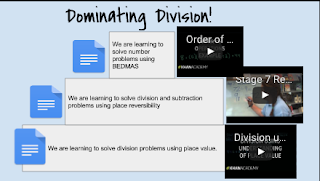Making Progress
I have just completed my mid year assessments and I am reflecting on what has supported my learners this term. To support my own observations and data, I have sent surveys to my learners to discover what they have found most helpful in each of their lessons.
1. Student Agency and Workshops
As part of my dissertation, I have been using a workshop approach to teaching maths a few times a week. My learners select which workshop(s) they need to attend and choose the activity aimed at their level. To support the learners when they are not with me, I have provided videos portraying the content that was covered in the workshop and materials. I have found that the students have been able to select the correct workshop and activity for their level. They noted that the small group environment, materials and time with the teacher were very helpful.
The students also have two problem solving lessons a week which I facilitate but let the students take the lead on. This means that we have a balance of teacher led and learner led maths lessons, which the students also found helpful.
2. Reciprocal Reading
This has been a huge hit with the learners and they can now run this with little teacher intervention. It is great to see them holding debates and discussion about the texts and trying to challenge each other with the questions that they are asking.
3. Fluent Reading
I noted that some of my less capable readers were not able to read fluently, so we made this a focus and we used Screencastify to record them reading aloud with expression. This was particularly beneficial for the students on the colour wheel, who have become far more fluent readers. Thanks to Clarelle who is working on this intervention for her dissertation.
4. Meaningful Experiences
I have tried to create as many language experiences as possible this term, which has been very beneficial to the students writing. However, it has also been wonderful to see the students apply their learning in real life or different contexts. For example, using our fractions and measurement knowledge in our class cooking lesson. I found that the students can consolidate and deepen their understanding of concepts this way. This was particularly apparent when we constructed Pompeii and I listened to conversations about the different parts of the volcano that they were creating and which Roman God their temple would be associated with.
1. Student Agency and Workshops
As part of my dissertation, I have been using a workshop approach to teaching maths a few times a week. My learners select which workshop(s) they need to attend and choose the activity aimed at their level. To support the learners when they are not with me, I have provided videos portraying the content that was covered in the workshop and materials. I have found that the students have been able to select the correct workshop and activity for their level. They noted that the small group environment, materials and time with the teacher were very helpful.
The students also have two problem solving lessons a week which I facilitate but let the students take the lead on. This means that we have a balance of teacher led and learner led maths lessons, which the students also found helpful.
2. Reciprocal Reading
This has been a huge hit with the learners and they can now run this with little teacher intervention. It is great to see them holding debates and discussion about the texts and trying to challenge each other with the questions that they are asking.
3. Fluent Reading
I noted that some of my less capable readers were not able to read fluently, so we made this a focus and we used Screencastify to record them reading aloud with expression. This was particularly beneficial for the students on the colour wheel, who have become far more fluent readers. Thanks to Clarelle who is working on this intervention for her dissertation.
4. Meaningful Experiences
I have tried to create as many language experiences as possible this term, which has been very beneficial to the students writing. However, it has also been wonderful to see the students apply their learning in real life or different contexts. For example, using our fractions and measurement knowledge in our class cooking lesson. I found that the students can consolidate and deepen their understanding of concepts this way. This was particularly apparent when we constructed Pompeii and I listened to conversations about the different parts of the volcano that they were creating and which Roman God their temple would be associated with.



Comments
Post a Comment